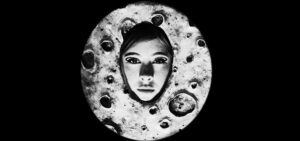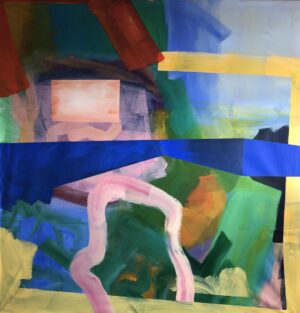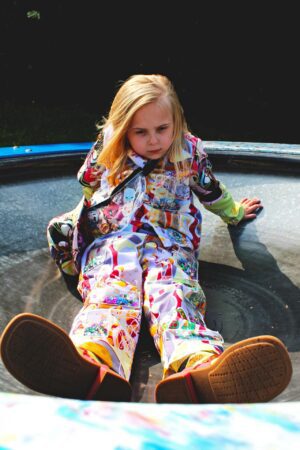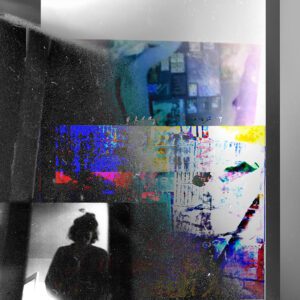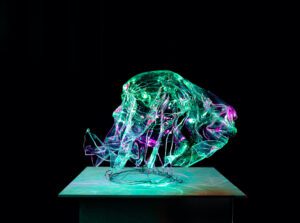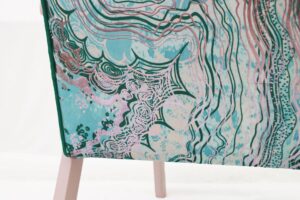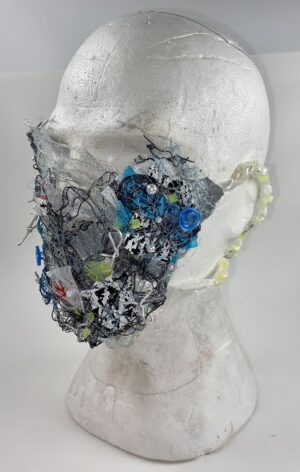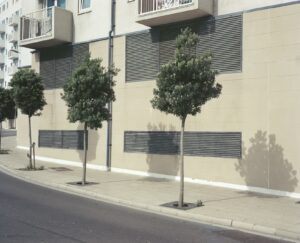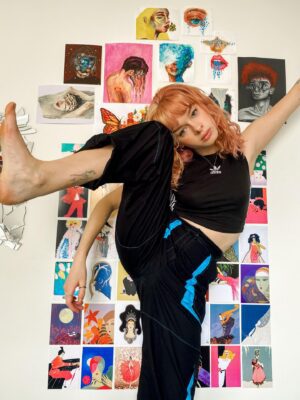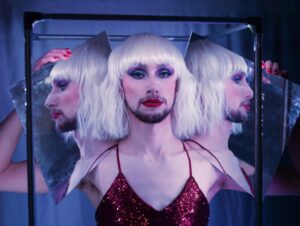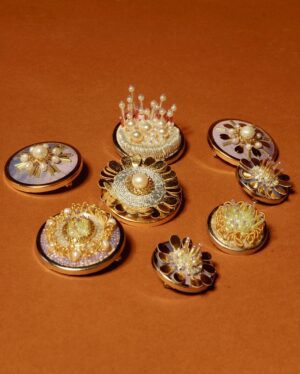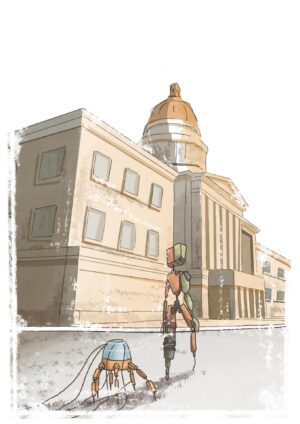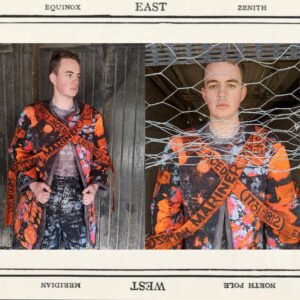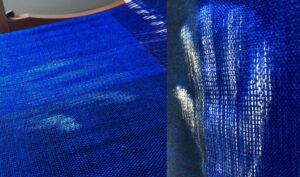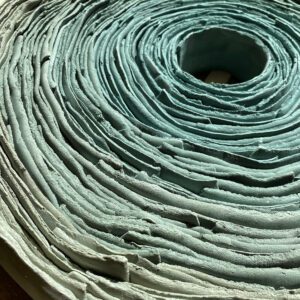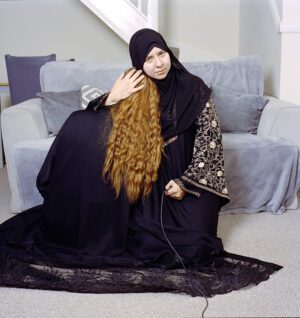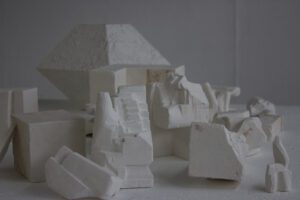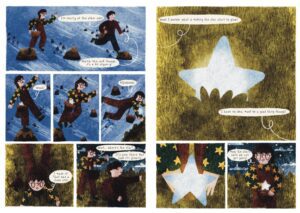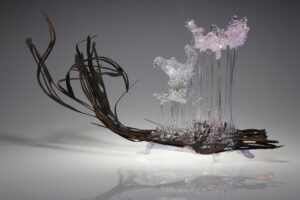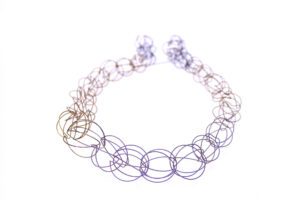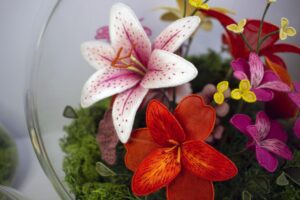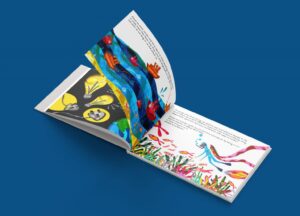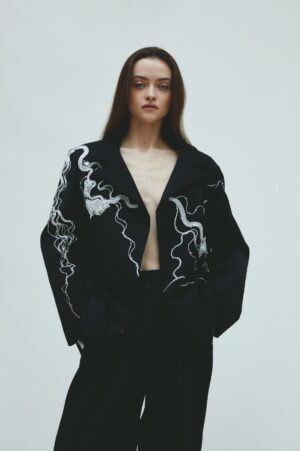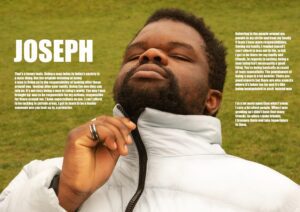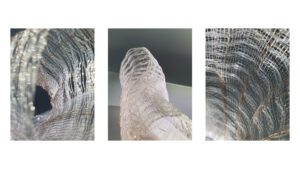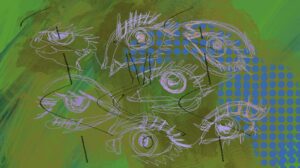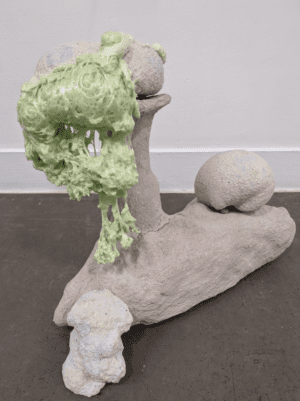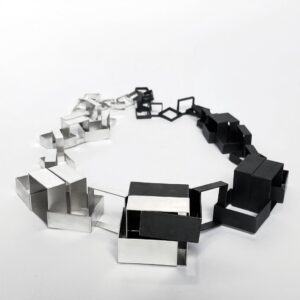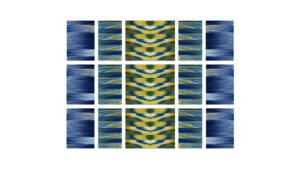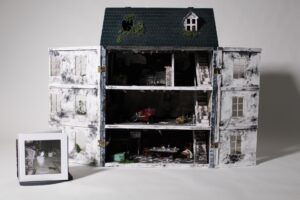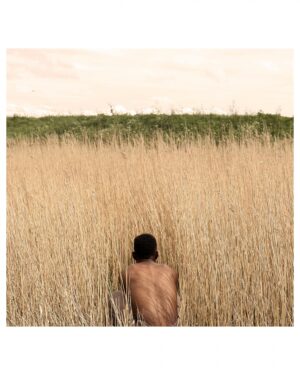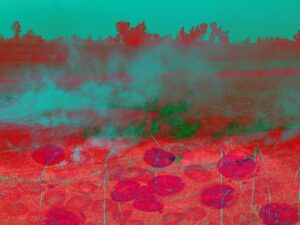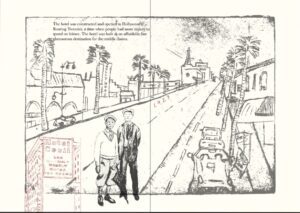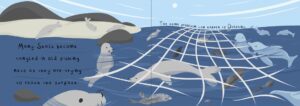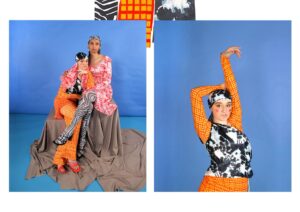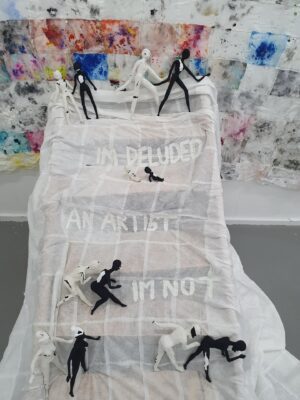
University for the Creative Arts Degree Show 2021
Class of 2021
Alicia Latham
Graphic designer Alicia Latham’s children’s storybook, Someone’s Bad Hair Day, stems from personal experience as a woman of colour.
Alicia Miller
This picture book is for children that struggle with anxiety. The story is about a young boy who is up late worrying about school, and a magic candle.
Annie Brown
“I don’t want to create timid or feeble paintings. Every mark must be bold and confident,” says Annie Brown, an artist creating large scale works.
Annie Matthews-Bruce
Playful Apparel is a genderless children’s wear collection created by Annie Matthews-Bruce. The clothing was inspired by toys and play.
Aryana Deen
Aryana Deen has a passion for image-making and various illustrative techniques. Key pieces in this showcase are focused on narrative storytelling.
Betty Onion
Signs of the Times is a document which captures a unique time in history through illustration and words, reflecting on the pandemic.
Bianca Rodrigues
Bianca Rodrigues’ graduate urban formalwear menswear collection is based on the Mughal reign in India and its influence on architecture.
Bradley Beckett
Bradley Beckett’s graphic design project depicts a voyage of self-healing and self-discovery during a period of uncertainty and mental health issues.
Carys Tupper
Digital Dreams explores the relationship between physical and digital worlds. Sculpture, projected film and photography break boundaries.
Charlotte Hickman
Hickman’s cushions, chair covers and blankets were influenced by collections of artefacts: prized possessions accumulated over time.
Charlotte Keiller
Made from recycled materials, Charlotte’s Keiller’s Think Outside the Sink and is based upon how our actions have affected marine life in our oceans.
Daryl Pallas
Daryl Pallas’ How Salty is the Mediterranean? examines themes of home, nostalgia, loss and memory, capturing spaces in Gibraltar.
Ellie Thomas
Ellie Thomas’ Remote series captures images of young dancers who have been forced to train within their homes due to lockdown.
Emily Larkin
Emily Larkin is a multi-award-winning animator whose 2D hand-drawn animation that aims to raise awareness about Vestibular Disorders.
Erin Ledsom
Through my Eyes is a personal story that focuses on Ledsom’s hometown: Hull. The artist uses unconventional materials to explore preconceptions.
George Mapston
George Mapston’s project was born from the Covid-19 pandemic, and a fascination with how the family unit can communicate exclusively digitally.
Georgie Pike
Georgie Pike’s collection comprises embroidered vintage dresses. The embroidery is influenced by pattern and shape, with embellished florals.
Grace Anderson
“Humans are widely regarded as human because they are controlled by their emotions.” Grace Anderson ask questions about machine intellect.
Hao Fu
Hao Fu uses photography to explore their hometown of Harbin in China. “The city has transformed into a lonely, ordinary, abandoned space.”
Henriette M Lillegaard
It Just Isn’t Home is written and illustrated by Henriette M Lillegaard. It tells of experiences of loneliness whilst studying abroad in the UK.
Hollie Phillips
Hollie Phillips’ bold, explicit and sometimes disturbing collection challenges the traditional idea of embroidery as a ‘feminine pastime.’
Holly Jo Crowhurst
Holly Jo Crowhurst graduate collection is historically inspired and focuses on the real story of mariner Michael Greenwood (1731–1812).
India Ashe
For her final major project, India Ashe explored the concepts of identity and memory. She represented these ideas through abstraction.
Jaime Dunlop
Jaime Dunlop’s graduate work explores both the presence of a singular object and the power of the collective group. The result is circular layers of clay.
Jemma Young
Jemma Young is a photographer working with constructed portraiture, stylised image compositions and digital manipulation.
Jodie Bateman
Jodie Bateman’s series challenges UK society to view Muslim women differently, by inviting the viewer into their private spaces.
Joe Fernandez
Fernandez’s work is about important people from the past: those who were forgotten by history despite doing something significant for the world.
Joseph Drew
Joseph Drew’s collection of architecturally-inspired work forms the foundation of a conceptually-driven cityscape of plaster and wood.
Jude Gibbs
Digital illustrator Jude Gibbs finds inspiration in nature, plants and animals. The artist created a children’s graphic novel exploring kindness.
Kate Courtney-Taylor
Specialising in kiln-formed glass, Kate Courtney-Taylor’s work explores the inherent properties of the material, focusing on how to freeze it in time.
Li Tzu Hung
Weave is a jewellery collection inspired by textiles – Li Tzu Hung’s aim is to create work that provides tactile stimulation and experiences.
Lizzie Lovell
Lizzie Lovell is driven by the desire to deliver compelling responses to the landscape, especially those surrounding the artist’s hometown.
Lucia Matano
Lucia Matano’s animation explores fears of growing up and being forced out of one’s comfort zone. It focuses how we can leave the past behind.
Lucy Green
Lucy Green’s work is a collective re-imagination of ideas she deems pertinent. The pieces combine unloved and pre-made ceramic objects.
Lucy Martin
Lucy Martin’s sculptural objects are a meditation on the beauty and serenity of nature, married with a sense of nostalgia and family.
Lucy Munt
50% of the Great Barrier Reef is dead. Illustrator Lucy Munt decided to take action towards helping to protect the coral reefs from destruction.
Millie Whitehead
Millie Whitehead’s works offer a new take on the crossover between male and female style and challenges dominant conceptions of gender.
Muriel Lagoutte
Boys by Mu is a visual response by photographer Muriel Lagoutte to conversations about masculinity. See more here.
Naddy Mizan
Naddy Mizan’s work looks at the rising seawater temperatures which cause coral to ‘glow’. “I am keen to capture the beauty of what we may lose.”
Philippa Hornsby
“Whether it’s gender or sexuality, having visibility matters.” Philippa Hornsby created and styled clothing for queer punk band The Dagger Tops.
Priyanka Pattni
Priyanka Pattni is a portrait photographer who utilises analogue and digital to convey the reclamation of space for minority groups.
Sam Webster
Sam Webster’s White Rabbit is a two-dimensional animation short that encompasses science fiction and mythic themes.
Scarlett Hope-Gates
Scarlett Hope-Gates is a contemporary mixed media artist working with exciting sculpture, drawings, screen prints and paper cutouts.
Seongeun Kim
Seongeun Kim’s work is inspired by abstract geometry. Full of square and geometric shapes, the works can be interpreted as a form of identity.
Shakhina Mirjonova
Mirjonova’s work was inspired by the artist’s cultural heritage and a technique known as Ikat, used by old master weavers in Uzbekistan.
Sian Maple
Sian Maple’s project Untitled: House is layered with narratives of personal trauma. The sculpture is combined with Untitled: Book 1.
Sonny Barthley
Through portraiture, Sonny Barthley explores the pain and trauma of African-Caribbean people who were kidnapped and transported to the UK.
Sukhwinder Singh
Sukhwinder Singh’s practice is inspired by the personal experience of living with bone cancer as a child; the work includes a selection of X-rays.
Tom Clayson
Tom Clayson’s graphic design project was inspired by The Vanishing at the Cecil Hotel, about a woman who mysteriously disappeared.
Wen-Yi Yap
Wen-Yi Yap wants to teach young children how important it is to keep the planet clean, but not in a daunting and overwhelming way.
Yasmine Cerbah
Cerbah’s collection is an exploration of the North African nomadic Amazigh tribe, combined with the designer’s personal penchant for animal print.
Zara Gabriel
Zara Gabriel has combined elements – tapestries, sculptures and hidden words – to create a paint covered, symbolic installation.


